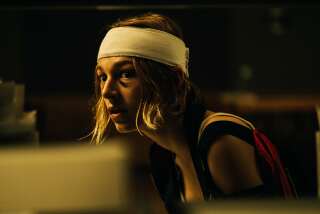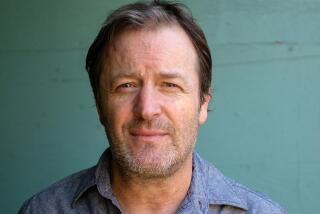Movie review: âThe Turin Horseâ
Starkly beautiful and exceedingly demanding, âThe Turin Horse,â which Hungarian master BĂŠla Tarr has said will be his last film, is both easy and impossible to define. It spins off the Nietzsche mythology that has the philosopher-poet throwing himself on a horse being whipped in the street not far from his doorway in 1889. Nietzsche would spend his remaining years in mental collapse. But what of the horse? asks Tarr.
The director, whose portraits of the Hungarian poor can seem etched out of tears, does not offer simple answers to that question or any other. What he does give us in âThe Turin Horseâ is a treatise on human existence at its most elemental, and in that he could not have been more eloquent. This, however, is not a film for everyone, taking its time as stubbornly and as deliberately as the horse that got the whipping.
The horse that starts it all is a classic beast of burden, a plodding dray of motley color that probably has never seen better days. Indeed, the idea that there are no better days for horse or humans in this life will shape the film.
That is certainly the case for Ohlsdorfer (JĂĄnos Derzsi), a farmer, and his daughter (Erika BĂłk), who live in an isolated cottage where the daily routines unfold with barely a word passed between them: eating the boiled potato that is their daily meal, the daughter helping dress the father, one side of his body weakened by a stroke, or so we assume. Tarr leaves you to draw your own conclusions from the circumstances he lays out.
Black and white and nearly silent except for a raging windstorm and a few philosophical bursts from a neighbor (MihĂĄly Kormos) who stops by to replenish his bottle of brandy, this is a story of hard times that unfolds with ever deepening resignation. The question that hangs over each day is whither the horse â will she pull the wagon today, will she eat, will she drink, will she die? Ohlsdorfer and his daughter simply care for her as they have always done. And wait. Like everything else, the fate of the horse is out of their hands.
As Tarr is wont to do, not much time elapses, here just a few days. But it is the detail of those days that informs and provokes, for it is impossible not to feel strongly about the directorâs work. Itâs best to just give into the undertow and let the images and the emotions he stirs so powerfully carry you away. As this hardscrabble family already knows, to fight is pointless.
Tarr is working with many of those he has over the years, co-directing with his wife, Ăgnes Hranitzky, and sharing writing credit with novelist LĂĄszlĂł Krasznahorkai, with whom he adapted one of his classic works, 1994âs âSĂĄtĂĄntangĂł,â among others.
The filmmaker has such a distinct visual style, crafting images like exceptional portraiture, studying the interplay of light and shadows on creased faces and stark landscapes. He somehow creates great beauty without ever softening the harsh reality heâs intent on exposing.
Shot by cinematographer Fred Kelemen, who also worked on Tarrâs last film, 2007âs âThe Man From London,â âTurin Horseâ features the unbroken tracking shots the director is famous for. The approach creates a strange sensation at times, as if the camera is a creature, an animal breathing down the charactersâ necks. At other moments, it captures such a profound stillness, father or daughter in the chair by the window, silently starring out at what the winds have wrought, that you can scarcely breathe for fear of disturbing their solitude.
Day by day in one seemingly endless week, father and daughter go through their routines. So specific, that by the end of the film, the way Ohlsdorfer peels his hot potato â stripping away the skin with his fingers, smashing it with the heel of his hand, dipping the pieces in salt, then putting them, still steaming, into his mouth â will seem second nature. But that is the point, or one of them.
The days are marked only by the wind and the chores. Occasionally, the outside world intrudes, a wagon of Gypsies turns up one day and is driven away in short order. Meanwhile, father and daughter deal with the bad hand life has dealt them, and for a while so do we.
By the time the filmmaker is through, whether you emerge into sunshine, or rain, itâs hard not to feel a kind of exhilaration and relief. Whatever father, daughter and the Turin horse face, at least itâs their fate, not yours.
More to Read
The biggest entertainment stories
Get our big stories about Hollywood, film, television, music, arts, culture and more right in your inbox as soon as they publish.
You may occasionally receive promotional content from the Los Angeles Times.











